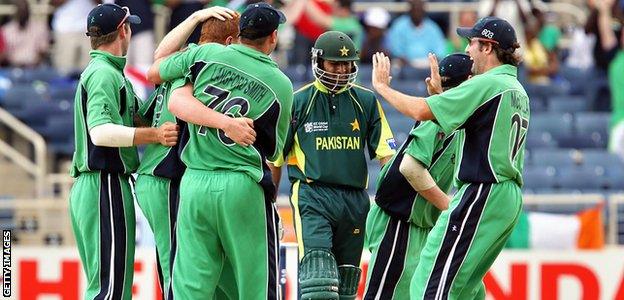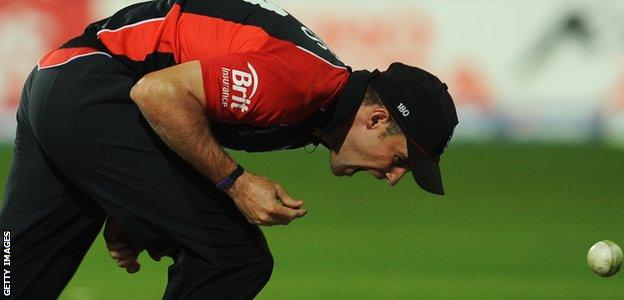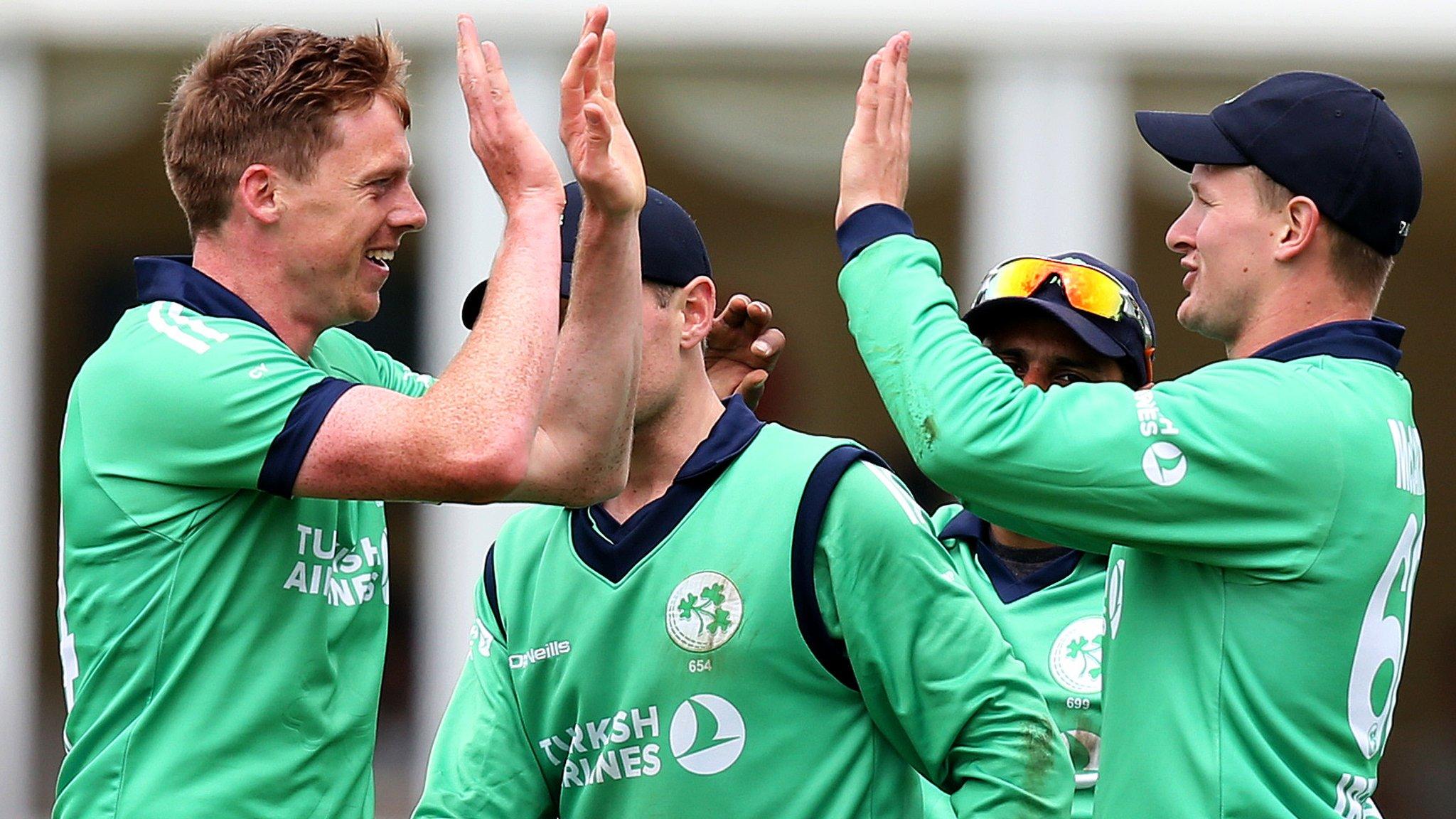Ireland v Pakistan: Ireland's route to Test match status
- Published
- comments
Ireland have to be smart on Test debut - Ford
Test match: Ireland v Pakistan |
|---|
Venue: Malahide CC, County Dublin Dates: 11-15 May Start: 11:00 BST |
Coverage: Updates on BBC Radio Ulster and reports on the BBC Sport website |
When Niall and Kevin O'Brien were going to school in Dublin in the 1990s, they kept their love of cricket to themselves.
For seven decades, cricket suffered under a ruling by the Gaelic Athletic Association that prohibited the playing or watching of "foreign" sports.
And whilst "The Ban" was finally lifted in 1971, the stigma surrounding what was perceived to be an English sport remained so acute that the O'Brien brothers' trips to the Railway Union cricket ground in the Dublin suburb of Sandymount remained clandestine throughout most of their formative years.
Fast forward to this Friday, at a ground just 20km up the road from Sandymount, Niall and Kevin will be parading their skills at the highest level of the game as they line up in their country's inaugural Test match against Pakistan.
On the eve of this historic occasion in Malahide, the BBC World Service's Stumped programme has been charting Ireland's journey to Test cricket and talking to Niall and Kevin about their starring roles in two of the team's most significant victories.
But before we hear from them, let's travel back to 1969 and an unforgettable day in the little-known Northern Irish village of Sion Mills.
The Miracle of Sion Mills
Midway through their tour of England in 1969, the West Indies travelled to Sion Mills for what should have been a routine hammering of a part-time Ireland outfit drawn from all corners of the Emerald Isle.
Instead, what transpired on that damp morning has become part of the folklore of Irish cricket.
Wicketkeeper Ossie Colhoun, a fitter at the local mill whose 700 employees were given the day off to watch the match, picks up the story.
"The West Indies arrived in a bus and went in to our pavilion, which was tiny, with one toilet and no showers," the 79-year-old tells Stumped presenter Alison Mitchell.
"The two captains went to the wicket and agreed that whoever won the toss the West Indies should bat. Everyone thought the Windies would get three or four hundred for six and bowl Ireland out for about 30.
"But they had just been playing on a hard track at Lord's and this track was damp and slow. So, when the two opening batsmen came out and tried to play their shots, they were through the shots too early.
Test wait finally ends for Ireland's Joyce
"Three of them were out cheaply, then there was a run out, and then Clive Lloyd holed out. They just kept hitting the ball in the air and before we knew it we had them 12 for 9. It was hard to believe and even harder to explain.
"The last pair put on 12, so maybe we let them off the hook a bit, but I suppose 25 all out wasn't bad!
"I think the local people wanted to see the West Indies putting the ball into the river. They had long poles and nets for fishing the ball out of the river. We didn't know how many balls we were going to need, but in the end one ball did the trick."
One of the legends around the match is that the Irish players plied their guests with Guinness the night before. But the truth, according to Ossie, is far more prosaic.
"Two or three of the Irish players were staying in the same hotel as the West Indians so as the local guy I agreed to take them to their hotel," he says.
"When we got there the bar was closed, there was a night porter on and the West Indies boys were nicely tucked up in bed.
"There wasn't any alcohol involved at all. It was a miracle, that's what it was."
Pakistan pummelled

Pakistan batsman Shoaib Malik is dismissed during Ireland's historic St Patrick's Day victory
If qualifying for their first World Cup in 2007 put Irish cricket on the launch pad, then it was their group stage victory over Pakistan that had them shooting off towards the stars.
After bowling out Pakistan for 132, external on St Patrick's Day, Niall O'Brien's 72 helped Ireland to the finish line in a nervy chase at Jamaica's Sabina Park.
"We were a bit of a motley crew," recalls O'Brien. "We had a farmer, a painter, a decorator, a postman and I was one of only three or four professional cricketers. But we were a very talented bunch with a great work ethic.
"On that day there were grey skies and there had been rain around. When the covers came off, we couldn't believe what we saw - it was just like playing at home.
"Their total was a low score, but we knew it would be a tough chase because they had a classy bowling attack.
"We just needed a good start and unfortunately we didn't get that, but thankfully things clicked into place for myself.
"When I got myself stumped for 72, I thought I'd let the side down. Then back in the dressing room I heard a couple of roars because Kyle McCallan and Andrew White were both out cheaply.
"We still needed 18 to win and I was really struggling with nerves. Our coach Adi Birrell was too nervous to go out on the balcony, so he just watched it on the TV in the dressing room."
Niall's brother Kevin joined forces with captain Trent Johnston to take Ireland to within a single of the line. And the skipper decided to finish things off with a flourish.
"When Trent hit that six it was euphoric. I imagine it was like someone scoring the winner in the World Cup final, or FA Cup final," continues O'Brien.
"You are so drained from the previous 45 minutes, to an hour. It was a class moment, an iconic moment, and it's kind of set us up for where we are today."
Bedlam in Bangalore

Kevin O'Brien hit 113 off 63 balls as Ireland pulled off an astonishing victory over England
For some in Ireland, true acceptance of cricket would never arrive until they could beat England , externalat their own sport. That feat was achieved in astonishing fashion as Ireland produced the highest run-chase in World Cup history to stun Andrew Strauss and his team at the 2011 World Cup in Bangalore.
This time it was Niall's younger brother Kevin who came to the fore, butchering an England attack featuring James Anderson and Stuart Broad with a record-breaking 50-ball century.
"It was a great day, a World Cup game against the old enemy," recalls O'Brien. "We had played them in 2007 in Guyana but came out on the wrong end of the result so it was nice to finally turn them over.
"England scored 327 but we were quietly confident of chasing it. We had come off two years of good cricket, the wicket was good and it was a very small ground.
"Losing the skipper [Will Porterfield] first ball wasn't ideal, but Paul Stirling and Ed Joyce batted well and got us into a decent position, then we lost a couple of quick wickets…"
When O'Brien walked to the crease, Ireland had slipped to 106-4. That soon became 111-5 when Gary Wilson was lbw to Graeme Swann in the 25th over.
"The momentum had gone and it was pretty much game over," says O'Brien. "I remember saying to Alex Cusack we could knock it around for another 20 overs, get 250 and lose respectably, or we could have a go, and if we get bowled out for 180 who cares?
"So we had a go for about 10 overs and things went our way. And we never looked back. Once it was 15 overs to go and we needed 100 I knew we'd win the game.

Dropped on 91 by England captain Andrew Strauss, O'Brien went on to reach his century off 50 balls, 16 fewer than the previous tournament record set by former Australia opener Matthew Hayden
"I'd trained very hard, playing some good cricket batting at number six for a couple of years so I knew my role in the team, knew my gameplan very well.
"It was just one of those days - everything I hit came out of the middle and when it didn't come out of the middle it went over the fielders' heads.
"Andrew Strauss dropped me on 91, so there was obviously a bit of luck as well. You need a bit of luck in big tournaments and fortunately for me and the Irish team, we had it that day."
O'Brien's hundred tore 16 balls off the previous fastest in World Cups by Australia's Matthew Hayden.
He adds: "I didn't even know about the record, I'm not one for stats. Once I got to three figures I dropped back a couple of gears and scored 13 off the next 13 balls and then I put in a terrible dive and got run out.
"But fortunately for us, Trent came out and hit his first ball for four leaving us needing eight off 11 balls. I knew we'd done it then.
"In my opinion, 2007 was the biggest win. It announced us on the world stage in our first World Cup, but 2011 reinforced to the cricket world that it wasn't a fluke and we really are a decent team."
A decent team, and now a Test team. Irish cricket, having crossed numerous hurdles in past decades, is now a fully-fledged member of one of sport's most exclusive clubs.
- Published23 June 2017
